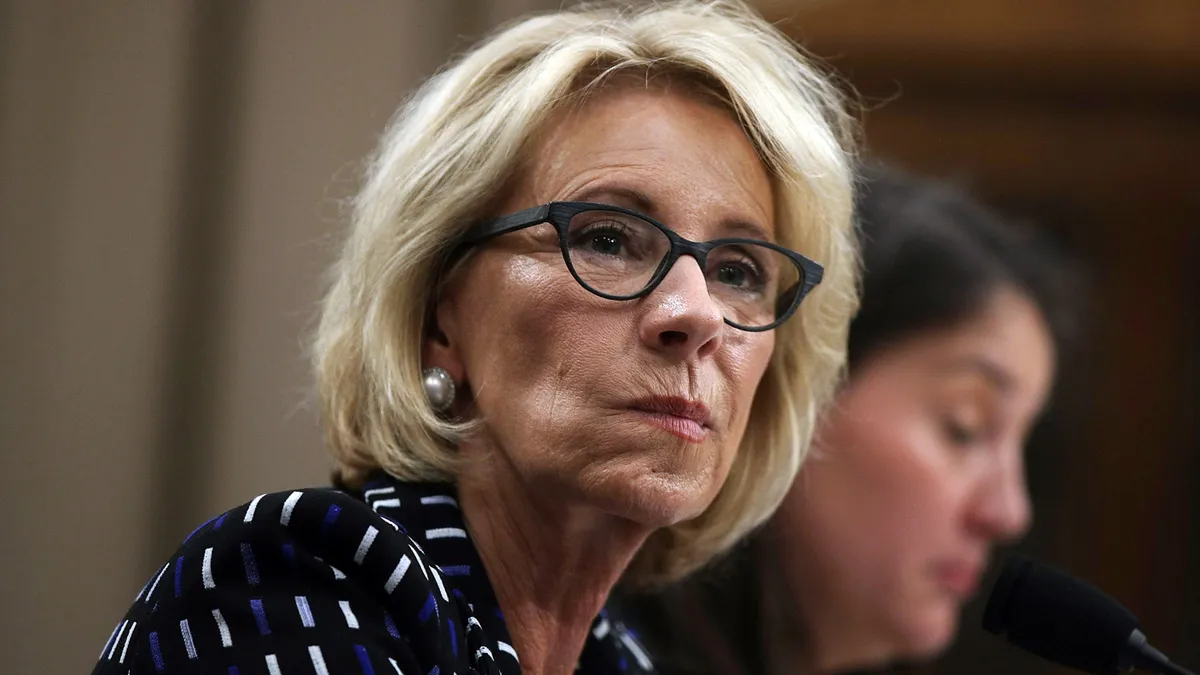Dive Brief:
-
In a lawsuit filed Thursday in federal court by the American Federation of Teachers (AFT), educators allege the mismanagement of a federal loan forgiveness program housed under the U.S. Department of Education violated the Administrative Procedures Act and teachers' rights to due process under the Fifth Amendment.
-
The lawsuit spells out how thousands of teachers and other public service workers are allegedly being denied forgiveness under the Public Service Loan Forgiveness (PSLF) program, which promised financial relief for those who spend a decade in the public sector and make 120 monthly payments.
-
According to the complaints, teachers who were told by service providers they were on track to earning loan forgiveness were denied relief after making the requisite payments. The lawsuit alleges the department intentionally stymied public service workers from accessing relief funds by committing administrative errors.
Dive Insight:
According to the most recent data provided by the Education Department, out of the 86,006 applications for PSLF submitted by 73,554 individuals, only 864 have been approved for debt forgiveness. Of that number, 518 — or less than 1% of applicants overall — have had their loans forgiven.
"It's clear the problem lies with the system," said Aaron Ament, president of the National Student Legal Defense Network, during a call with journalists on Wednesday.
However, this is not a new problem, said AFT President Randi Weingarten during the call. Instead, it emerged when first-time applicants were eligible for forgiveness in September 2017.
After initial numbers released by the department a year later showed more than 70% of applicants were denied, watchdog group the U.S. Government Accountability Office (GAO) released a report suggesting only 55 of the more than one million borrowers who took steps to pursue PSLF as of April 2018 were granted loan forgiveness.
To correct those shortcomings, the department established the Temporary Expanded Public Service Loan Forgiveness program (TEPSLF). The program was designed to allocate $700 million in loan forgiveness over a two-year period for applicants accepted on a first-come, first-served basis.
However, federal data shows nearly 12,000 applicants for the temporary program have been rejected, while only 442 were accepted. As of April 2019, only $10.6 million of the designated $700 million has actually been spent.
Gloria Nolan, a plaintiff in the case, said when she applied for the TEPSLF program, she was denied without reason. When she finally heard from the service providers, Nolan said, she wasn't given a consistent explanation.
"I heard all kinds of reasons — the paperwork was wrong or I pulled the wrong application from the official website or that they changed a few questions since I filled it out," she said. "When I faxed in some forms, they claimed that they couldn't read the forms."
Last year, the GAO found many service providers tasked by the department to carry out the program still appear confused about its basic requirements over a decade after its implementation.
In recent years, miscommunication within the department has also resulted in teachers having to pay back loans that were initially provided as grants under the Teacher Education Assistance for College and Higher Education (TEACH) Grant program, giving teachers an unexpected financial burden.
Weingarten suggests this problem is not surprising, considering Republicans' proposed 2020 budget saw significant cuts to programs like TEACH. Over the years, the administration has also repeatedly sought to end PSLF entirely.
"[I was] told that you can achieve the American Dream if you pull yourselves up by the bootstraps, and to me this process is setting those boots in cement," Nolan said.







 Dive Awards
Dive Awards






